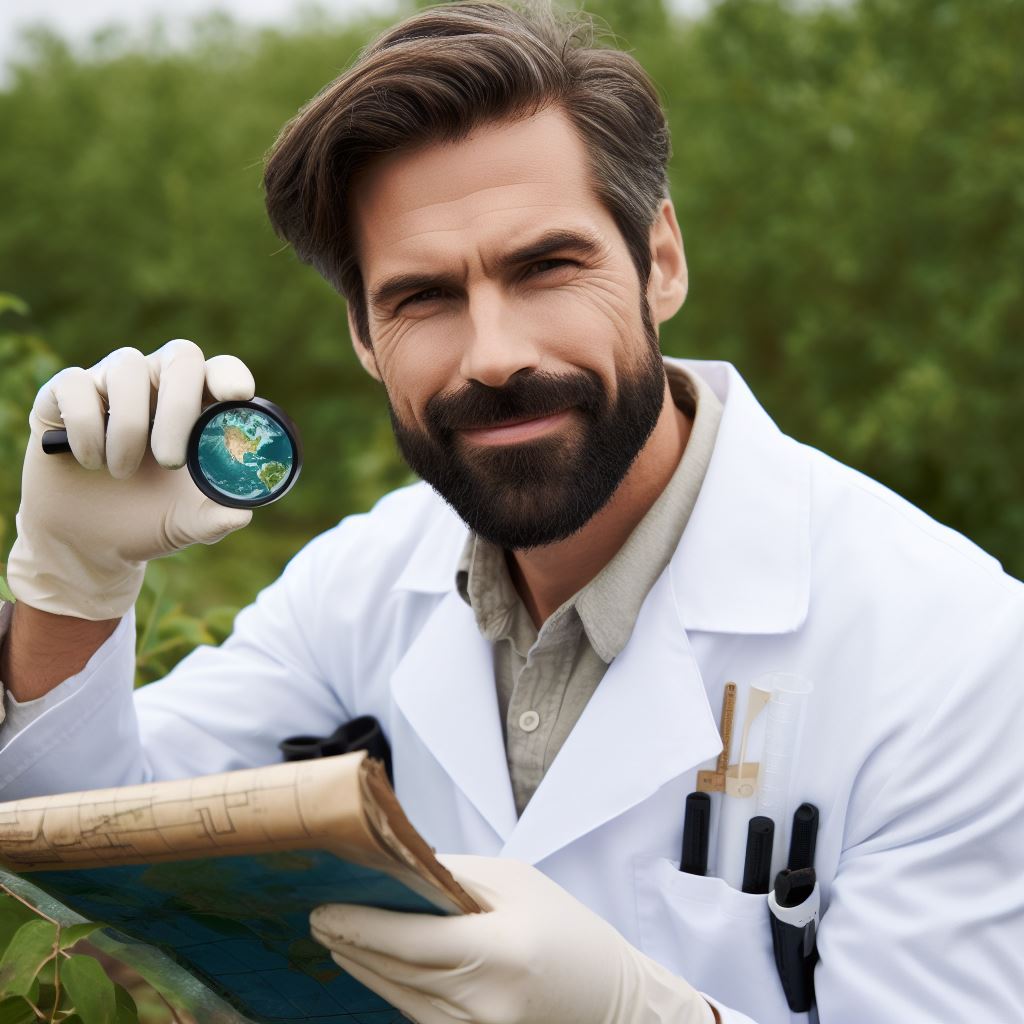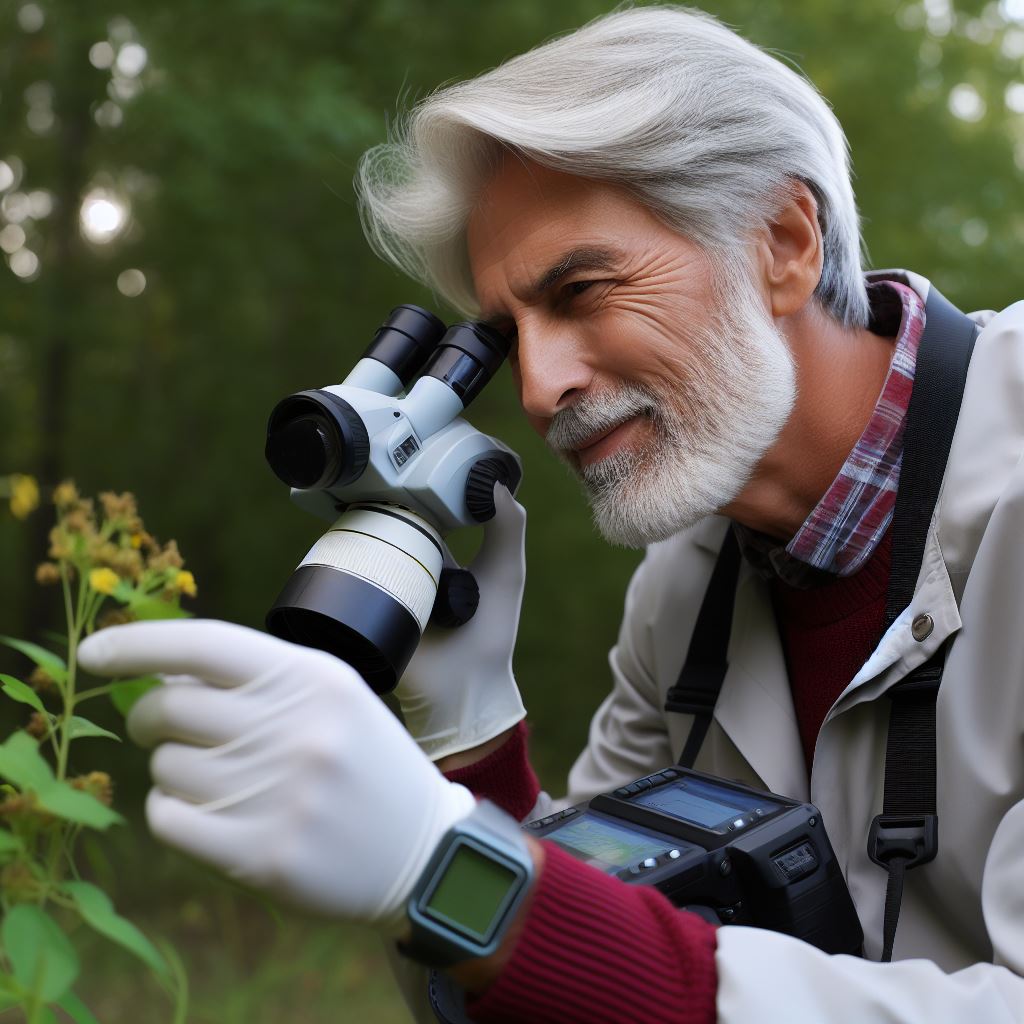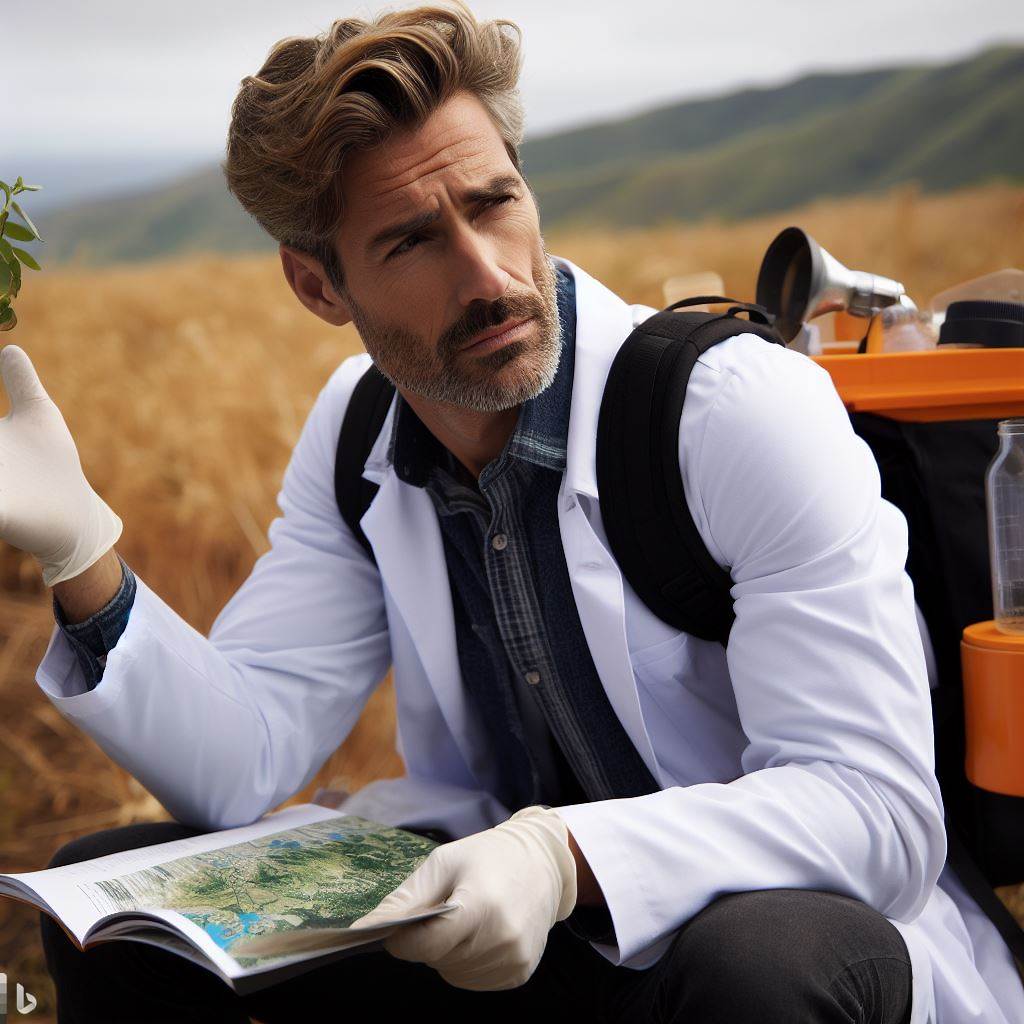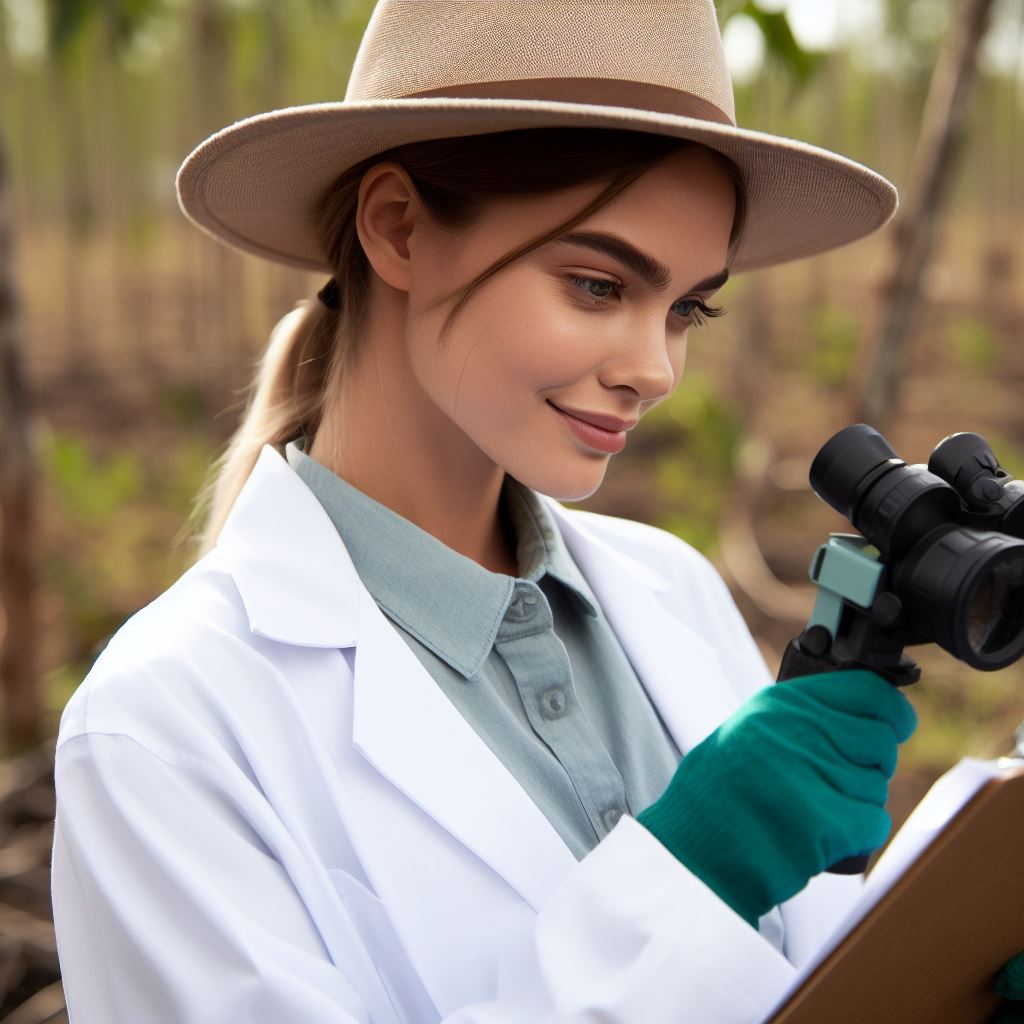Introduction
The World of Environmental Scientists
Environmental scientists play a crucial role in understanding and addressing the complex environmental challenges facing the United States.
Their work encompasses a wide array of disciplines, from ecology and conservation to environmental chemistry and climate science.
Purpose of the Post
In this blog post, our primary aim is to shine a spotlight on the invaluable contributions of U.S. environmental scientists.
By sharing their stories, we hope to create awareness and appreciation for the critical work they do.
We want to showcase the real people behind the research, their motivations, and the impact of their efforts.
What to Expect
Throughout this post, we will offer a glimpse into the lives of these dedicated professionals. We’ll share their personal stories, insights, and experiences.
You can expect to learn about the daily challenges they face, the innovations they bring to the field, and the real-world impact of their research.
We will explore their ongoing efforts to tackle pressing environmental issues and understand the passion and dedication that drive them.
Join us on a journey of exploration and inspiration as we engage with these experts and learn from their experiences.
Together, we’ll gain a deeper understanding of the incredible work being done by U.S. environmental scientists to protect and preserve our planet.
Get ready to be inspired and informed as we bring you the voices of those at the forefront of environmental science.
Background on U.S. Environmental Scientists
Definition and Role of Environmental Scientists
Environmental scientists are professionals who study the environment and its various components.
They collect data, analyze information, and develop strategies to address environmental issues.
These scientists focus on understanding the impact of human activities on the natural world and finding solutions to mitigate those impacts.
They work across different sectors, including government agencies, non-profit organizations, and private companies.
Environmental scientists play a crucial role in preserving and managing our natural resources.
Importance of Their Work in Addressing Environmental Challenges
The work of environmental scientists is essential in addressing the urgent environmental challenges we face today.
They contribute to the conservation of biodiversity, protection of ecosystems, and management of natural resources.
By studying the environment and its dynamics, they can identify potential risks and propose sustainable solutions.
Environmental scientists also play a vital role in advocating for policies and regulations that promote environmental sustainability.
Through their research and findings, they provide valuable insights to policymakers, enabling informed decision-making.
Statistics and Growth of the Profession in the United States
The profession of environmental scientists has experienced significant growth in the United States in recent years.
According to the Bureau of Labor Statistics, the employment of environmental scientists is projected to grow by 8% from 2019 to 2029.
This growth is faster than the average for all occupations, indicating a strong demand for environmental expertise.
The increasing concern for sustainability and the need to address environmental issues drive this demand.
As environmental regulations become more stringent, the role of environmental scientists becomes increasingly important.
Environmental scientists are needed to assess environmental risks, conduct impact assessments, and develop sustainable solutions.
Transform Your Career Today
Unlock a personalized career strategy that drives real results. Get tailored advice and a roadmap designed just for you.
Start NowEnvironmental scientists play a critical role in understanding and addressing environmental challenges.
They contribute to the conservation of natural resources and advocate for sustainable practices.
The profession is growing, indicating the increasing importance of their work in the United States.
As environmental concerns continue to rise, the expertise and efforts of environmental scientists are indispensable.
We must continue to support and invest in this profession to ensure a sustainable future for our planet.
Importance of Real Stories: Interviews with U.S. Environmental Scientists
Highlighting the impact of personal experiences and narratives
Real stories: interviews with U.S. environmental scientists provide valuable insights into the personal experiences and narratives of those working in the field.
These stories go beyond the scientific facts and data, allowing readers to connect with the individuals behind the research.
By highlighting personal experiences, these interviews give a human face to the often complex and abstract
field of environmental science.
Readers can relate to the challenges, sacrifices, and triumphs that these scientists have faced in their careers, making the information more accessible and relatable.
Moreover, personal stories have the power to evoke emotions and create a lasting impact. When we hear about the struggles and successes of real people, we become invested in their journeys.
This emotional connection can drive us to take action and make a difference in our own lives.
The ability to inspire and inform aspiring environmental scientists
Real stories: interviews with U.S. environmental scientists have a unique ability to inspire and inform aspiring
environmental scientists.
Reading about the paths these scientists have taken, the challenges they have overcome, and the impact they have made serves as a source of motivation for those considering a career in environmental science.
These interviews provide valuable guidance and advice to aspiring environmental scientists.
They offer insights into the educational background, skills, and experience required to succeed in the field.
Through these diverse narratives, readers can gain an understanding of the various career paths available and identify the areas they are most passionate about.
Furthermore, by showcasing the accomplishments of environmental scientists, these interviews demonstrate the potential for impact and change in this field.
They show that through dedication, hard work, and a strong commitment to environmental conservation, individuals can make a real difference in the world.
Different perspectives and insights shared through interviews
Real stories: interviews with U.S. environmental scientists present a range of perspectives and insights.
Each scientist brings their unique background, expertise, and research interests to the table, providing a diverse and multifaceted understanding of environmental science.
These interviews offer a platform for scientists to share their knowledge, experiences, and opinions on various
environmental issues.
Readers gain access to expert insights that they may not find in traditional scientific papers or textbooks.
This firsthand information enables a deeper comprehension of complex environmental challenges and potential solutions.
Additionally, through these interviews, scientists can discuss their ongoing research projects and highlight the
significance of their work.
This exposure not only promotes collaboration and knowledge-sharing within the scientific community but also raises awareness among the general public about the critical environmental issues at hand.
Real stories: Interviews with U.S. environmental scientists crucially highlight personal experiences, inspire and inform aspiring scientists, and share diverse insights.
By incorporating interviews into our understanding of environmental science, we can foster a
greater connection to the field and encourage meaningful action towards environmental conservation.
Read: Fields of Specialization: Niche Areas for Biologists in the US
Interview 1: Dr. Jane Lubchenco
Introduction to the scientist, including background information
Dr. Jane Lubchenco is a renowned environmental scientist and a leading figure in marine ecology.
She received her PhD in ecology from Harvard University and has since dedicated her career to studying and advocating for ocean conservation.
Dr. Lubchenco served as the Administrator of the National Oceanic and Atmospheric Administration (NOAA) from 2009-2013 and was the first woman to hold this position.
Summary of the interview questions and answers
During the interview, Dr. Lubchenco discussed her research on the impacts of climate change on marine ecosystems.
She highlighted the importance of understanding the connections between human actions and environmental changes.
When asked about her most significant findings, she emphasized the role of biodiversity in maintaining ecosystem resilience and the urgent need for conservation efforts.
Dr. Lubchenco also shared her thoughts on the role of science communication in influencing policy decisions and public awareness.
Showcase Your Business Today
Reach thousands of readers actively exploring professional services. Publish your business profile and grow your audience now.
Publish NowKey takeaways from the interview, highlighting interesting points or experiences
Biodiversity and Ecosystem Resilience:
Dr. Lubchenco stressed the crucial role of biodiversity in maintaining the resilience of marine ecosystems.
She explained that diverse ecosystems are better equipped to withstand and recover from disturbances such as climate change.
Human Connections to the Environment
The scientist emphasized the interconnectedness between human activities and environmental changes.
She recognized the need for a holistic approach that considers the social and economic factors driving environmental degradation.
Conservation and Sustainable Management
Dr. Lubchenco highlighted the importance of conservation efforts to restore and protect marine ecosystems.
She advocated for the implementation of science-based policies and the integration of sustainable practices in various sectors.
Science Communication
In discussing the role of science communication, Dr. Lubchenco emphasized the importance of making science accessible to policymakers and the public.
She shared her belief that scientists have a responsibility to communicate their findings effectively to influence decision-making processes.
Challenges and Opportunities
Dr. Lubchenco acknowledged the challenges faced by environmental scientists, such as limited funding and political resistance.
However, she also expressed optimism about the growing recognition of the importance of scientific expertise in addressing environmental issues.
Basically, Dr. Jane Lubchenco’s interview shed light on her groundbreaking research in marine ecology and her commitment to environmental conservation.
Her insights underscore the urgent need for biodiversity conservation and sustainable management practices.
Furthermore, she highlighted the critical role of science communication in influencing policy decisions and fostering public awareness.
Dr. Lubchenco’s work serves as an inspiration to current and future environmental scientists, who strive to protect and preserve our planet’s precious ecosystems.
Read: Research Opportunities: Leading Biology Projects in America
Interview 2: Dr. Michael Mann
Introduction to Dr. Michael Mann
Dr. Michael Mann is a renowned environmental scientist and climatologist, known for his profound research on climate change.
He is currently a professor at Penn State University, where he directs the Earth System Science Center.
Summary of the Interview Questions and Answers
During the interview, Dr. Mann was asked various questions related to his work and experiences as an environmental scientist. Here is a summary of the key questions and his insightful answers:
- How did you become interested in studying climate change?: Dr. Mann explained that his interest sparked during his graduate studies, where he recognized the significant impact of human activities on the Earth’s climate system.
- What are some of the major challenges faced by climate scientists today?: He pointed out that one of the biggest challenges is the denial and misinformation spread by certain groups, which hinders the public’s understanding of the severity of climate change.
- What groundbreaking research have you conducted in the field of climate science?: Dr. Mann discussed his famous hockey stick graph, which depicted a rapid increase in global temperatures in recent decades. This graph played a crucial role in emphasizing the urgency of addressing climate change.
- How do you communicate complex scientific findings to the general public effectively?: He emphasized the importance of simplifying scientific concepts without oversimplifying them, utilizing visual aids, and finding relatable analogies to engage the public in understanding climate change.
- What advice do you have for aspiring environmental scientists?: Dr. Mann advised aspiring scientists to pursue their passion, remain persistent, and never shy away from taking a stand against climate change denial.
Key Takeaways from the Interview
The interview with Dr. Michael Mann provided several interesting insights and experiences:
- Climate scientists face significant challenges in tackling climate change, including misinformation and denial from various groups.
- Dr. Mann’s research, particularly the hockey stick graph, has played a vital role in raising awareness about the urgency of addressing climate change.
- Effective communication is crucial for climate scientists to engage the public and convey complex scientific findings in an understandable manner.
- Aspiring environmental scientists should pursue their passion, persist in their work, and actively combat climate change denial.
Basically, Dr. Michael Mann’s interview shed light on the vital role of climate scientists in addressing climate change.
His research and dedication highlight the urgency of taking action to mitigate the effects of climate change on our planet.
Effective communication and combating misinformation are key in creating awareness and inspiring change.
Aspiring environmental scientists can draw inspiration from Dr. Mann’s journey and continue working towards a sustainable and resilient future.
Read: Challenges & Rewards: The Realities of Being a Biologist in the US

Interview 3: Dr. Katharine Hayhoe
Dr. Katharine Hayhoe is a renowned environmental scientist with a specialization in climate change.
She holds a Ph.D. in Atmospheric Science from the University of Illinois and is currently a professor at Texas Tech University.
Dr. Hayhoe has contributed significantly to the field with her research on climate change impacts and adaptation strategies.
Summary of the interview questions and answers
During the interview, Dr. Hayhoe shared her insights and experiences related to her work as an environmental scientist:
Question:
How did you become interested in studying climate change?
Answer:
Dr. Hayhoe explained that her interest stemmed from her upbringing in Canada, where she witnessed the effects of climate change on the communities she lived in.
Question:
What are the key challenges you face in communicating climate science to the public?
Answer:
Dr. Hayhoe emphasized the importance of connecting climate change to people’s everyday lives and addressing their concerns rather than presenting scientific jargon.
Question:
What motivated you to focus on climate change adaptation strategies?
Answer:
Dr. Hayhoe mentioned that she felt a responsibility to provide tangible solutions for communities facing climate change impacts, which led her to focus on adaptation strategies.
Question:
How can policymakers effectively address climate change based on scientific evidence?
Answer:
Dr. Hayhoe stressed the significance of policymakers relying on scientific expertise and evidence to develop effective climate change mitigation and adaptation policies.
Key takeaways from the interview
Dr. Katharine Hayhoe’s interview provided several important insights:
- Climate change impacts can be understood more personally when related to people’s daily lives and experiences.
- Effective communication of climate science requires translating complex concepts into relatable language.
- Adaptation strategies are crucial for communities to cope with the adverse effects of climate change.
- Policy decisions should be informed by scientific evidence to address climate change effectively.
- Environmental scientists have a responsibility to communicate and provide solutions for climate change challenges.
The interview with Dr. Hayhoe demonstrates the practical application of scientific knowledge in addressing climate change.
Her emphasis on effective communication and adaptation strategies highlights the importance of connecting with communities and implementing tangible solutions.
Dr. Katharine Hayhoe’s expertise and dedication in the field of climate change have made her a leading voice in environmental science.
Her insights from the interview emphasize the need for scientists, policymakers, and the general public to work together in addressing the challenges posed by climate change.
Read: Day in the Life: Routine Tasks for a US-Based Biologist
Uncover the Details: Challenges and Rewards: Navigating the Chemist Career Path
Gain More Insights: Biology and Tech: The Intersection in the American Context
Learn More: How Forensic Science Solves Criminal Cases
Delve into the Subject: Famous Geneticists and Their Contributions
Common Themes and Lessons from the Interviews
Identifying recurring themes or trends among the scientists’ experiences
- Collaboration: Many environmental scientists highlighted the importance of working together with colleagues from diverse backgrounds.
- Research: Conducting thorough scientific research was a common theme among the interviewed scientists.
- Data Analysis: Proper analysis of collected data was seen as crucial for making informed decisions in environmental science.
- Communication: Effective communication skills were emphasized by the scientists, both in terms of presenting research findings and engaging with stakeholders.
- Environmental Policies: The impact of environmental policies and regulations on scientific work was a recurrent topic.
- Climate Change: Almost every scientist acknowledged the urgent need to address climate change and its far-reaching consequences.
Lessons learned or valuable insights shared by the environmental scientists
- Persistence: The scientists emphasized the importance of persistence in overcoming challenges faced in their research.
- Adaptability: Flexibility and adaptability were considered essential traits for navigating the complex field of environmental science.
- Mentorship: Many scientists spoke about the significant role that mentors played in shaping their careers and providing guidance.
- Continuous Learning: A commitment to lifelong learning and staying updated with the latest research and technologies was advised.
- Importance of Data: Scientists stressed the need for accurate and reliable data to support decision-making in environmental science.
- Holistic Approach: Taking a holistic approach that considers social, economic, and cultural factors alongside scientific findings was seen as essential.
How these stories can offer guidance and encouragement to readers
- Inspiration: The experiences shared by the environmental scientists can inspire readers to pursue a career in environmental science or related fields.
- Awareness: The interviews shed light on the critical environmental issues our planet faces, raising awareness among readers.
- Practical Tips: The valuable insights shared by scientists can offer practical tips for those already working in the field or aspiring to become environmental scientists.
- Motivation: Through the scientists’ stories, readers can find motivation to overcome obstacles and contribute to positive change.
- Networking: The emphasis on collaboration highlights the importance of building networks and collaborating with peers in the field.
- Advocacy: The interviews can encourage readers to become advocates for environmental conservation and take action in their own communities.
Essentially, the interviews with U.S. environmental scientists uncovered common themes and lessons that can guide and encourage readers.
Collaboration, research, data analysis, and effective communication were identified as crucial aspects of the scientists’ experiences.
Lessons in persistence, adaptability, mentorship, continuous learning, and holistic approaches were shared.
These stories can inspire, raise awareness, provide practical tips, motivate, highlight the significance of networking, and encourage advocacy for environmental conservation.
By learning from these stories, readers can contribute positively to environmental science and make a difference in protecting our planet.
Showcase Your Business Today
Reach thousands of readers actively exploring professional services. Publish your business profile and grow your audience now.
Publish NowExplore Further: Marine Biology Career Paths and Options
Learn More: Geologist Salaries: What to Expect in the USA
Conclusion
The Significance of Real Stories
Throughout this blog post, we’ve emphasized the importance of real stories and interviews with environmental scientists.
They serve as a bridge between the scientific community and the general public, making complex environmental issues more relatable and tangible.
The Call to Explore
We invite our readers to explore further into the field of environmental science.
Dive into more stories and interviews, broaden your understanding, and gain insights that can empower you to contribute to environmental preservation.
Final Note
In closing, we’d like to leave you with a powerful thought. Your own stories and experiences are valuable tools for change.
Share your environmental journey, your discoveries, and your insights. Engage with the community, be part of the solution, and make your voice heard.
By collectively sharing our stories and experiences, we can inspire positive action and drive meaningful change for a more sustainable and resilient future.
So, let’s take action, share our stories, and be a force for environmental progress.
[E-Books for Sale]
The Big Book of 500 High-Paying Jobs in America: Unlock Your Earning Potential
$19.99 • 500 High-Paying Jobs • 330 pages
Explore 500 high-paying jobs in America and learn how to boost your career, earn more, and achieve success!
See All 500 High-Paying Jobs of this E-Book
1001 Professions Without a Degree: High-Paying American Jobs You Can Start Now
$19.99 • 1001 Professions Without a Degree • 174 pages
Discover 1001 high-paying jobs without a degree! Unlock career tips, skills, and success strategies for just $19.99!




